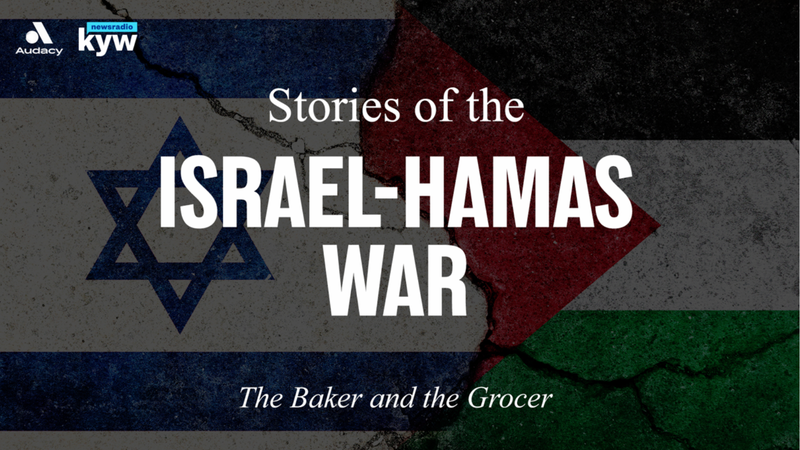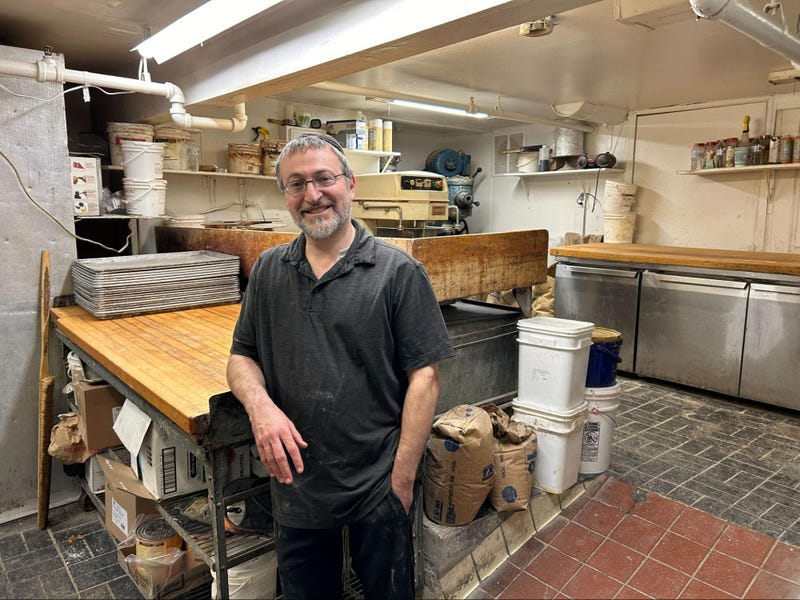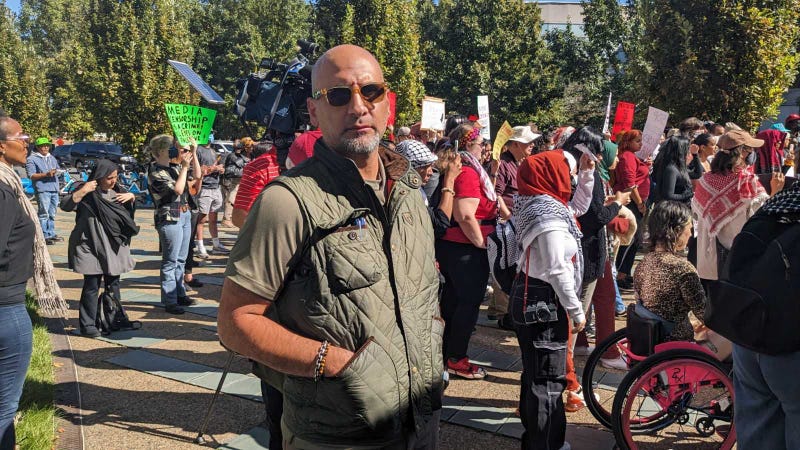
"We’re not a turn-the-other-cheek religion. If somebody’s coming into your house to kill your family, you kill them."
"My taxes are going to the killing of my people. That’s very unfortunate."
🎧 Listen
PHILADELPHIA (KYW Newsradio) — Israel Roling and Ray Mustafa are both 48-year-old small-business owners who work in the food industry.
They each have six kids and are deeply religious.
Their families’ ancestral lands are just 90 miles apart.
Yet the stances these Philadelphia-area men have on the Israel-Hamas war couldn’t be farther apart.
“How are we supposed to have peace with a partner that doesn’t want peace?” said Roling, who is Jewish.
“Am I justifying what happened? Absolutely not,” said Mustafa, who is Palestinian, when asked about the Oct. 7 Hamas terror attack that killed 1,200 Israelis. “What I’m telling you is … [Palestinians] are desperate. The world is ignoring them. There’s been a historic injustice against them — 75 years of it.”
Roling, the second-generation owner of Roling’s Bakery in Elkins Park, is ultra-Orthodox. His father, born in Haifa, Israel’s third-largest city, opened the shop in 1975. Years later, when Roling got involved in the family business, he convinced his dad to make it Kosher, in accordance with Jewish dietary law.
Thirteen miles away in West Philadelphia, Mustafa, a Muslim whose parents still live in the West Bank, operates a small, non-ethnic grocery store. He requested the name of his store not be identified for fear of backlash.
Over the past two months, Roling and Mustafa have been gripped by the events unfolding in the Middle East.
“I’m always jumping around from X [formerly Twitter] to TikTok to Facebook to Instagram, looking for different articles,” said Mustafa.
Not only are they following media coverage, they’re staying in touch with family, friends and acquaintances in the region.
“Anyone who walks into the bakery, anybody who’s Jewish, we just look at each other,” Roling said. “We know we’re all hurting inside.”

Beneath their intense and entrenched views on the Israel-Hamas war, Roling and Mustafa have much in common. The connections go layers beyond age, livelihoods and family.
They are bonded by the way the ripple effects of the war have seeped into all aspects of their lives.
“Things are tough right now,” said Roling. “We’re pulling together. So maybe we get stronger, not weaker.”
Mustafa says he hugs his kids and “squeezes them like there’s no tomorrow.”
Another similarity between the two? The Israel-Hamas war has rekindled generational trauma.
Roling’s 93-year-old maternal grandmother survived the Holocaust.
“I went to visit her a couple weeks ago, and she’s just crying because she’s seeing things she saw when she grew up.”

Mustafa said his great-grandfather was killed by colonial British soldiers in the 1948 Arab-Israeli war.
“It has been never-ending,” he said of the cycle of violence in the Middle East.
To cope with the current conflict, Mustafa has channeled his faith.
“You see the people in the Gaza Strip, everything they’re going through, and they’re calling out to God. They’re always praying. They’re always hopeful that what they’re going through is going to give their kids a better future,” he said.
“If you don’t have hope and you don’t have a strong connection to your God, you will be lost in this world.”
Faith is Roling’s get-by as well — another parallel between two people on opposite sides of a massive divide.
“Where are all these ancient civilizations that tried to kill [the Jewish people]?” Roling said. “We're still here. So, in my mind, of course God's with us. Of course God wants us to be here. That itself is a reason for me to believe.”
As the war continues in Gaza, the rapidly growing death toll among Palestinians is creating political divides across the United States, with some calling for a cease-fire and others defending Israel’s right to avenge the terror attack and protect its people against future violence.
Both Roling and Mustafa see the morality of the issues as plain as black and white.
“I personally look at every death that happens there as on Hamas, not on Israel,” said Roling of the nearly 20,000 Palestinian deaths reported by the Gaza Health Ministry since the war began. “[Hamas] went in and murdered people horrifically … If we don't do something, it's gonna happen again.”
Mustafa said, “you got two options. You could accept the world dehumanizing [Palestinians] and treating them this way. Or you could educate yourself, become a successful person and defend them. The choice is yours.”
So how do they see the endgame? Do they ever envision Israelis and Palestinians coexisting peacefully?
🎧 Listen to the complete podcast
For more on the stories and perspectives of Roling and Mustafa, listen to the KYW Newsradio original podcast “The Baker and the Grocer: Stories from the Israel-Hamas war” free on the Audacy app, or wherever you listen to podcasts.
